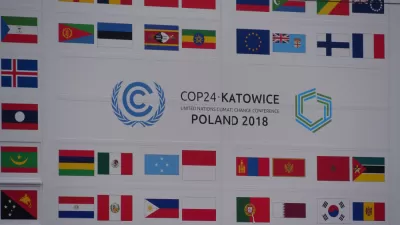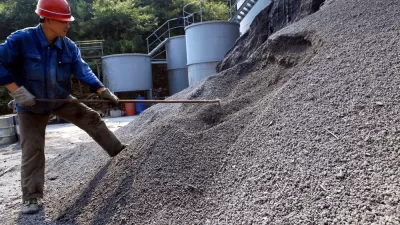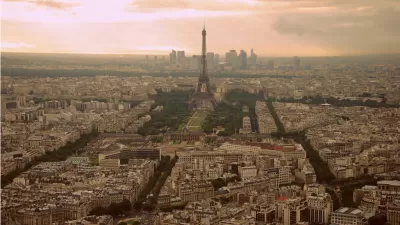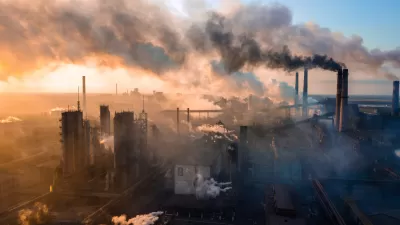Representatives from nearly 200 nations have been attending the U.N. Climate Change Conference in Katowice since Dec. 2 to work on implementing the 2015 Paris climate agreement. Scheduled to end Friday, it will be extended two days due to discord.

[Update: Brad Plumer, climate reporter for The New York Times, reports on Saturday from Katowice that a deal has been reached that "will ultimately require every country in the world to follow a uniform set of standards for measuring their planet-warming emissions and tracking their climate policies."]
"Critical climate talks have been extended by two days after big polluters including the US and Saudi Arabia pushed back against key scientific findings," reports Josh Gabbatiss, science correspondent for the London-based Independent, on Friday.
Tensions are running high in the Polish city of Katowice following two weeks of fraught discussions at the UN COP24 summit between countries with very different climate agendas.
Experts cautiously welcomed a draft agreement that was finally released on Thursday night, but countries must now resolve outstanding issues, including pledges to ramp up emissions cuts.
WIth Russia and Kuwait, these four leading oil producers blocked the full endorsement of the Intergovernmental Panel on Climate Change’s "Special Report on Global Warming of 1.5°C. "The IPCC was invited to prepare this Special Report by the 21st Session of the Conference of the Parties (COP21) of the United Nations Framework Convention on Climate Change (UNFCCC) in Paris in December 2015," according to a June 2016 UNFCCC press release.
Nations are working in Katowice on the rulemaking needed to implement the 2015 Paris climate agreement effective 2020, including how to report emissions and how richer nations will help finance climate action in poorer nations.
Interesting audio reports with transcripts from NPR on the climate conference:
- On Dec. 14, Rebecca Hersher reports from Katowice on how some American businesses, who have sent representatives to the talks, are committed to reducing their carbon footprint despite President Trump's decision in June 2017 to withdraw from the Paris agreement.
- On Dec. 13, Audie Cornish reports on how the U.S. can advance climate negotiations under President Trump in a very informative discussion with Jonathan Pershing, former Special Envoy for Climate Change under President Obama and now the Program Director of Environment at the William and Flora Hewlett Foundation. Yes, the U.S. did send an official delegation, even if they proved disruptive. Pershing explains the U.S. remains in the agreement "until the day after the next presidential election." He has some good things to report in spite of the U.S. withdrawal and the science controversy.
- On Dec. 12, Hersher reports on mayors and governors who rebut the Trump administration position at the climate summit in an informative discussion with Pittsburgh Mayor Bill Peduto who is attending the conference representing U.S. mayors who have signed America's Pledge. See his June 7, 2017, New York Times op-ed with Mayor Anne Hidalgo, "The Mayors of Pittsburgh and Paris: We Have Our Own Climate Deal."
This is Peduto's third time attending an international climate meeting. He says Pittsburgh's history as a city built on coal and steel but now moving away from industry makes him a good representative to the meeting.
Under Peduto, Pittsburgh has pledged to transition its city government's energy use to entirely renewable sources by [2035], and decrease its overall energy use by half. [At least one local columnist writes, "Not gonna happen."
Successful summit if disagreements are resolved
Washington Post reporters Griff Witte Brady Dennis also report from Katowice on the talks on Friday.
Laurence Tubiana, a French diplomat who presided over the 2015 Paris talks and is considered a key architect of the landmark agreement, said that if drafts of this year’s deal hold together, the summit will be judged a success.
The achievements of Katowice, she acknowledged, were highly technical in nature, with no new grand pronouncements. But that, she said, was not what was required. “Sometimes we want everything to be a big splash,” she said. “But that’s not reality.”
FULL STORY: COP24: Climate change talks extended as US and other major polluters hold up landmark agreement

Planetizen Federal Action Tracker
A weekly monitor of how Trump’s orders and actions are impacting planners and planning in America.

Chicago’s Ghost Rails
Just beneath the surface of the modern city lie the remnants of its expansive early 20th-century streetcar system.

San Antonio and Austin are Fusing Into one Massive Megaregion
The region spanning the two central Texas cities is growing fast, posing challenges for local infrastructure and water supplies.

Since Zion's Shuttles Went Electric “The Smog is Gone”
Visitors to Zion National Park can enjoy the canyon via the nation’s first fully electric park shuttle system.

Trump Distributing DOT Safety Funds at 1/10 Rate of Biden
Funds for Safe Streets and other transportation safety and equity programs are being held up by administrative reviews and conflicts with the Trump administration’s priorities.

German Cities Subsidize Taxis for Women Amid Wave of Violence
Free or low-cost taxi rides can help women navigate cities more safely, but critics say the programs don't address the root causes of violence against women.
Urban Design for Planners 1: Software Tools
This six-course series explores essential urban design concepts using open source software and equips planners with the tools they need to participate fully in the urban design process.
Planning for Universal Design
Learn the tools for implementing Universal Design in planning regulations.
planning NEXT
Appalachian Highlands Housing Partners
Mpact (founded as Rail~Volution)
City of Camden Redevelopment Agency
City of Astoria
City of Portland
City of Laramie





























